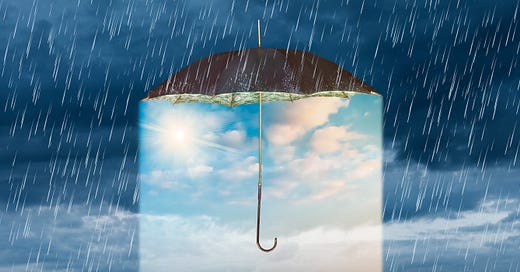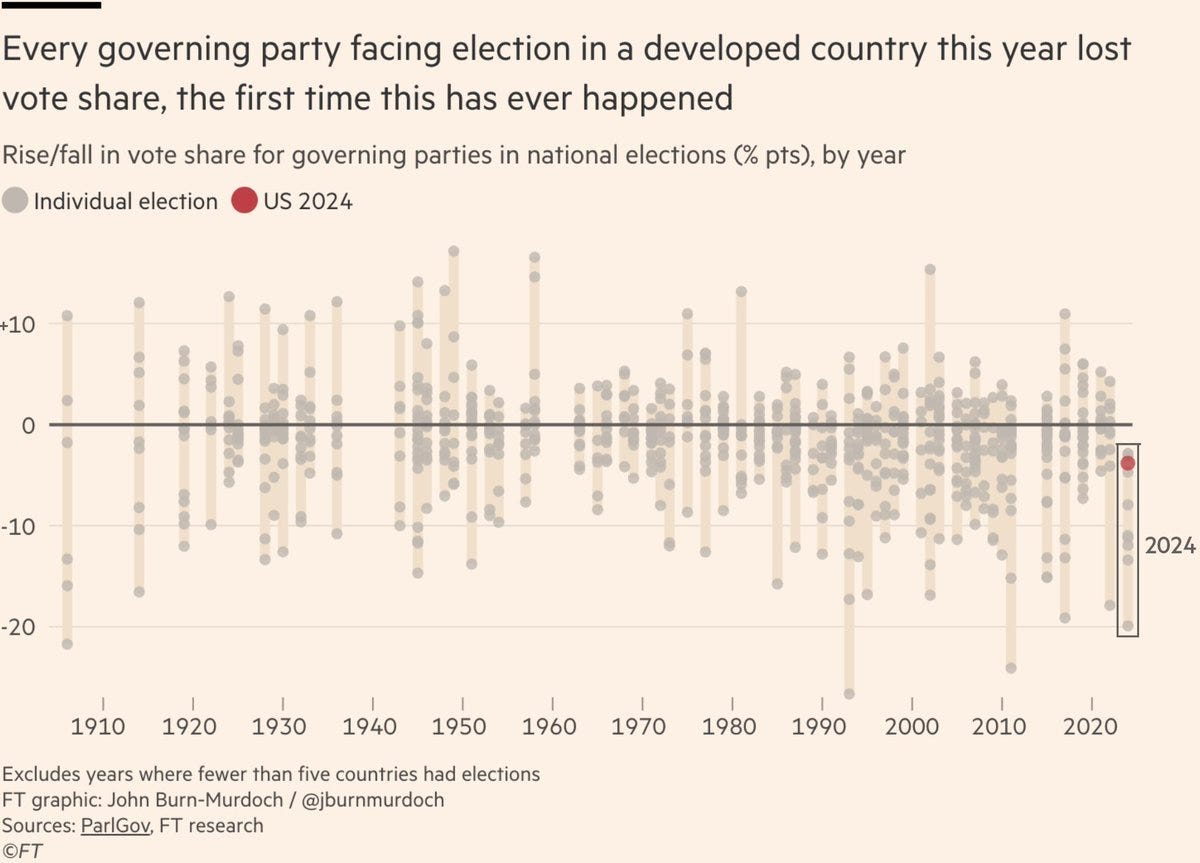Choosing Hope, Facing Anguish
A few post-election musings. Plus, how inflation impacted the vote.
We’re now three days past the 2024 election. There are a lot of visceral feelings out there. I’ve had conversations with friends about the election, from both sides of the aisle, and have been reading and pondering the aftermath. So here are three thoughts I have at the moment.
I’ll be back in a couple of days with a few additional thoughts about 2024. And then I’m going to move on. I’m not going to stop writing about politics and the issues that surround this election, but I also hope to go back to more of a balance of topics, which is how I started The Riel World. With a healthy dose of politics, but with a bit more history, travel, books, and other ideas thrown into the mix.
For the moment, though, let’s reflect a bit on what happened this week.
1. We have to choose hope. We have to root for America.
First, let me say that I sincerely hope Donald Trump during his second term succeeds in making America a better place. If you care about America, you have to root for it.
I realize in saying this that I am already giving Trump more grace than many Republicans have given to any Democratic president in a few decades. (See: policies of deliberate obstructionism, even when it meant a bipartisan solution was kicked to the curb in the name of denying the president a victory). But my belief remains that country is always more important than party. And if we stop believing this then it really will be the end of democracy.
Now, am I optimistic? Not tremendously, but I am remaining open to it. Am I worried that Trump is making politics in this country more vulgar and coarse and intolerant, perhaps beyond repair? Yes. Am I worried about the fate of American democracy? Yes. Are there legitimate reasons for people to feel anguished? Yes (see #3 below).
Nevertheless, if Trump fails to leave the country better, then we will all be worse off. And I refuse to root for that. So whether or not I’m optimistic is sort of beside the point, I have to remain hopeful about how things will play out.
President Joe Biden has said many times: “You can’t love your country only when you win.” It’s a good motto for everyone.
I choose hope.
2. It’s still the economy, stupid.
James Carville’s famous line from the 1992 campaign is still prescient.
Among Americans who voted this year, Kamala Harris’ favorability rating was ever so slightly higher than that of Donald Trump. And 54% of voters thought Trump’s policies were too extreme for the country. Yet Trump won easily. In fact, of those voters who thought Trump was too extreme for America, 12% voted for him anyway.
Why? Check out this chart compiled by the Financial Times:
It goes back to 1905, showing results for governing parties in national elections in democracies around the world. You’ll notice that 2024 is the first year ever that every single incumbent party lost ground, no matter the country. In fact, the red dot is the United States, meaning Democrats actually fared better than almost every other governing party that faced voters this year.
There is an anti-incumbent mood sweeping the globe, and a big reason is that voters are fed up with inflation. I know that Republicans are happy to blame Biden’s policies for inflation, but the truth (which most of them know) is that it’s a global phenomenon caused by a hangover from the COVID crisis.
It’s exceedingly common for inflation to follow a crisis like that of COVID. I’ve noted this before, but it’s worth repeating:
The worst monthly inflation rate of the past few years was 9.1% in 2022. It is currently back to normal at 2.4%.
In 1980, the rate hit 14.8%.
In 1947 it was 19.7%.
And in 1920 it was 23.7%.
Each one of those inflation crises came right after a jarring event: after World War I and a global pandemic in 1920, after World War II in 1947, after the 1970s energy crisis in 1980, and after another global pandemic in 2022.
If you look at it from this perspective, there isn’t a heck of lot that any governing party can do other than mitigate the damage. In that respect, the Biden administration looks quite respectable, as the U.S. economy recovered from the pandemic crisis faster and stronger than other nations. The Economist published a special report just three weeks ago saying “the American economy has left other rich countries in the dust.”
Nevertheless, it doesn’t change the fact that voters are hurting. Even if inflation is back to normal levels and other signs are strong, people are scarred by how much prices increased in a short period of time. This is still foremost in everyone’s mind, particularly since prices haven’t come back down. Unfortunately, most prices still aren’t going to go back down and there’s nothing Trump can do about it either unless he can change the laws of economic gravity. Eventually, though, people’s anger will abate as they adjust to the reality and as wages increase.
In the meantime, when voters are angry about how difficult it is to pay bills, they take revenge in the only place they’re able to express frustration. At the ballot box.
Obviously, the Democrats had a few other problems unrelated to the economy that they could have handled better this year. I have a few thoughts about that which I’ll get to in another piece. But Republicans had other issues too, starting with their candidate. The bottom line is that any other issues were swamped by perceptions of the economy.
In fact, after seeing the exit polls, I’d venture to guess that if Republicans had nominated a more traditional candidate (you know, someone whom a majority of voters didn’t see as too extreme for America) they might well have won a larger victory.
Only 52% of voters saw Trump as better able to handle the economy, versus 46% for Harris. That’s not much of a difference, considering Harris was tied to the Biden administration and inflation. But close to one-third of voters said they were primarily looking for a candidate who could bring change, and of those 74% cast a ballot for Trump, as they surely would have for any GOP candidate.
That’s pretty much the election right there.
If that many people are looking for change, then it almost doesn’t matter who the candidate is, of either party. The candidates aren’t deciding the election, it’s being decided for them by voters’ desire to “upset the apple cart.” Voters wanted change and Trump was the change agent, despite everything else that made them uneasy about him.
3. Why people are so anguished
I asked a question to some friends after the election: “Anyone else feel like they fell asleep a few years ago and woke up in a world they don't recognize?”
There was an outpouring of responses from people who are feeling exactly that. There is real anguish out there, and there are legitimate reasons for it.
And I want to emphasize that those reasons are not mere disappointment over which party won the election. Honestly, if Nikki Haley or Chris Christie or someone else had defeated Kamala Harris, I really can’t imagine there’d be the same outpouring of despair.
Presidents and policies come and go. In a democracy, the pendulum always swing back and forth. It’s been normal since the dawn of America to find people disappointed with election results, but over time each side has a chance to implement their ideas and programs. So, sure, most Democrats would have been disappointed by Haley’s or Christie’s positions on health care or climate change or whatever, but the world would otherwise have felt relatively normal.
This is something different. There is real anxiety over the sense that politics has been broken, that the country we care about is hopelessly divided, and that American values of tolerance and democracy are withering on the vine. And, of course, angst about Trump himself.
If you were to go back to pretty much any period of American history, whether it’s to the era of George Washington or Teddy Roosevelt or Ronald Reagan, and tell people that America had elected a man who was a convicted felon and a convicted sexual abuser, who had already tried to violently overturn the results of a democratic election, who was most comfortable with authoritarians abroad, whose own staff and cabinet members from his first term had said he was dangerous to America, and who had campaigned on the suggestion that his political opponents be jailed or shot, well, they would all think you were delusional. This is so against the norm of American history that it’s close to unbelievable.
There is also considerable worry or disbelief beyond that. Three examples:
There are women who are stunned that the next president is a convicted sexual abuser who has bragged about grabbing women by the p***y and has been accused of sexual assault by 27 women.
There are many in the LGBTQ community who are terrified they’re going to lose rights. They’re well aware that many GOP supporters of Trump (including Supreme Court justices) believe the right to gay marriage or same sex relationships is unconstitutional and should be overturned, just as Roe v. Wade was.
There are also millions of Americans who care desperately about democracy and who see signs the nation might be going down the road of Hungary or Turkey, where a healthy democracy has crumbled. It’s notable that many conservatives in Trump’s orbit point to Hungary as a model for what can be achieved in the U.S.
Will any of this come to pass? Maybe not. But also, maybe. It depends on whether some of the campaign talk was bluster to get people riled up enough to vote, or whether it was promises that will be fulfilled.
So yeah, people worry that the story of America as a beacon of democracy for the world is disappearing. They are anxious that their vision of an accepting, inclusive America is fading. They worry their kids are going to inherit a country that is more divided and angry and intolerant than the one they grew up in.
As I said, we have to choose hope. But that doesn’t mean there isn’t angst.
Photo: Image via Shutterstock.






There will come a day where I can be sanguine about this. But right now, I’m too close to primal screaming. As always, I’m impressed by your rational review of the situation.